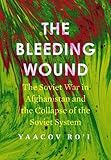The bleeding wound : the Soviet War in Afghanistan and the collapse of the Soviet system / Yaacov Ro'i.
Material type: TextSeries: Publication details: Stanford, California : Stanford University Press, (c)2022.Description: 1 online resource : illustrationsContent type:
TextSeries: Publication details: Stanford, California : Stanford University Press, (c)2022.Description: 1 online resource : illustrationsContent type: - text
- computer
- online resource
- 9781503631069
- DS371 .B544 2022
- COPYRIGHT NOT covered - Click this link to request copyright permission: https://lib.ciu.edu/copyright-request-form
| Item type | Current library | Collection | Call number | URL | Status | Barcode | |
|---|---|---|---|---|---|---|---|
 Online Book (LOGIN USING YOUR MY CIU LOGIN AND PASSWORD)
Online Book (LOGIN USING YOUR MY CIU LOGIN AND PASSWORD)
|
G. Allen Fleece Library ONLINE | Non-fiction | DS371.2 (Browse shelf(Opens below)) | Link to resource | Available | on1259298785 |
Includes bibliographies and index.
The decision to intervene militarily in Afghanistan -- The course of the war -- The Fortieth Army -- The position of the Soviet political establishment -- The implications of the Soviet-Afghan War for the Soviet military -- Coverage of the war in the Soviet media -- Public opinion -- The afgantsy -- Central Asia and the Soviet "Muslim" peoples -- The war and the demise of the Soviet Union.
"This book considers the significance of the the Soviet-Afghan War (1979-1989) to Soviet politics, society, and the military in the twilight of the USSR, and its indirect influence on the evolution of its successor states. Yaacov Ro'i argues that the war had significant effects beyond its direct impact on the large number of Soviet citizens who served in Afghanistan during its course, either as soldiers (afghantsy) sent into Afghanistan to uphold the PDPA Marxist regime that had taken power in Kabul in April 1978, or as advisers and civilian specialists dispatched to Afghanistan to build up and modernize the country on the Soviet model and bring it closer to the Soviet Union. Even if officially the Soviets did not lose the war, the very fact that they were unable to decisively defeat the mujahidin comprised a blow to the self-esteem of the Soviet armed forces and undermined their prestige at home. In this comprehensive examination of the effects of the war on Soviet society and politics, Ro'i considers the portrayal of the war in Soviet media, and the struggles that afghantsy veterans faced as they readapted to civilian life. The war and the way it came to be understood by Soviet citizens also served to highlight the weaknesses of the Soviet regime during glasnost'. Through a detailed account of public opinion surrounding the war and its impact on Soviet politics and society in the Gorbachev era, including extensive interviews that the author conducted with Soviet war veterans in the early 1990s, Ro'i argues that the effects of the war certainly precipitated processes that would tear the country asunder in 1991"--
COPYRIGHT NOT covered - Click this link to request copyright permission:
There are no comments on this title.
